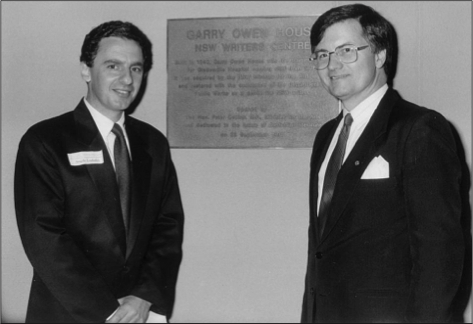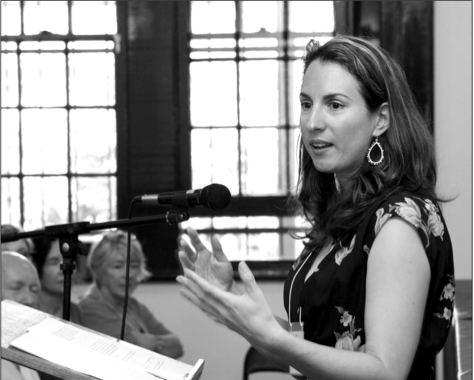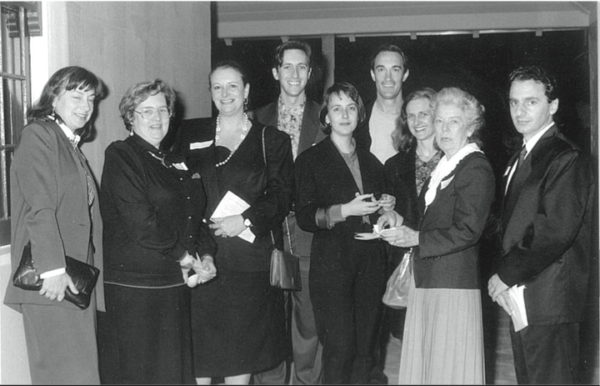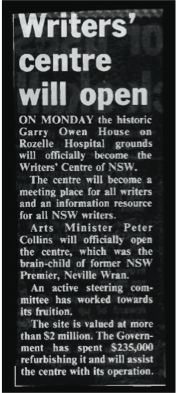In 2016, Writing NSW (formerly NSW Writers’ Centre) celebrated its 25th anniversary. To celebrate the occasion, Administration Officer Cassie Watson wrote the following article for the October-November 2016 edition of Newswrite.
Cassie Watson celebrates 25 years of the NSW Writers’ Centre
“The general perception of the lonely writer hammering away long night hours over the word processor or typewriter is slightly off beam. Idealistic and romantically clichéd as it may seem… we need somewhere to come together — a place to commiserate, share our knowledge and ideas, to enjoy and celebrate our world of words.” — Adele Moy, founding co-ordinator of the NSW Writers’ Centre, Newswrite, February 1992
It’s been nearly 25 years since this was published in one of the earliest issues of Newswrite, but the essential purpose of the NSW Writers’ Centre has hardly changed in a quarter of a century.

The Centre was created when writer Angelo Loukakis and a group of other advocates from the literary community lobbied the government to establish a facility for the development of writers. It was officially opened in the historic Garry Owen House in Callan Park on 23 September 1991, by then Minister for the Arts, Peter Collins.
Courses and festivals have always formed the backbone of the Centre’s programs. In its first year of operation, the Centre staged a handful of courses on topics ranging from poetry to article writing, later supplemented by the then annual Spring Writing Festival. Today, the program has expanded to include courses most weekends, three festivals each year, and a host of other events and activities.
The organisation has grown in size, certainly, and members may now chuckle at the announcement in the first Newswrite that the acquisition of a fax machine had made the office less archaic. Yet at its core the Centre was created to be a place of community for writers in a solitary endeavour, and that purpose endures today.
FINDING FELLOWSHIP
Novelist Emily Maguire knows her writing journey would have been a lot lonelier if it weren’t for her involvement with the Centre. She first joined the organisation in 2003, a year prior to the publication of her debut novel, and at the time didn’t know a single other writer. Over the years she’s found great encouragement from interacting with writers at all stages of their careers.
Angelo Loukakis, who became the Centre’s first Chair, sees this development of a writing community as the most pleasing aspect of the organisation. He looks fondly on the connections he has made with fellow writers: in spite of — or indeed because of — the lonely nature of writing, meeting with fellow scribes is invaluable.
Writers’ groups have been an integral part of the Centre’s activities since the beginning. The Youngstreet Poets group was formed in 1978 and has been meeting at the Centre for over a decade. Convenor Willem Tibben says the group consists of poets who are serious about improving their craft. Meeting with other writers is advantageous because it gives them a deadline to produce high-quality work to share, and they can all benefit from their combined wisdom and experience. By gathering at the Centre, they are also inspired by the literary atmosphere of the venue.
Fellowship is not limited only to those writing in the same genre or form. The 2014 Playwriting Festival stands out clearly in Maguire’s memory, as she recalls the inspiration she gained from the keynote speech. Lally Katz encouraged the audience to have confidence in their writing and put themselves out there, something Maguire needed to hear at that stage in her career. Even though she isn’t a playwright herself, Maguire values learning from those who write in different forms and genres.

‘YOU NEVER STOP LEARNING’
As well as fostering fellowship between writers, the Centre has cultivated over the years its focus on developing writers of all stages. Loukakis recalls that the organisation was born out of a desire by many in the writing community for a means to assist new and emerging writers in growing their skills. There is no sense of exclusivity, he says, of the kind that says only those writers with a publication record deserve to be recognised and supported.
Kate Forsyth, whose dozens of books have received international acclaim, credits the Centre’s courses as critical for her early development as a writer. When she first joined in 1996, she had to walk to the Centre and back, bringing her own lunch, or she couldn’t have afforded to attend courses.
Although she later went on to do a masters in writing, Forsyth considers the accessible and practical courses at the Centre to have accelerated her career. She even got the idea for her first published novel from reading Newswrite. In the opportunities column, a particular competition was asking for short stories in the fantasy genre. Having recently finished writing a novel as the creative part of her thesis, she decided to use her upcoming holidays to try writing something new.
‘By the end of the day I was pretty sure that short story would be a novel,’ she says, ‘and by the end of the week I was pretty sure it would be a trilogy.’
That one moment of inspiration came to fruition the following June when her first novel Dragonclaw was published, which went on to become a highly successful six-book series.
Even now, after the publication of multiple books each, both Forsyth and Maguire are grateful for the significant role the Centre still plays in their careers. They have taken up positions as course tutors, which have given them new perspectives on the craft.
‘It’s not just for beginners’, Maguire says of the Centre’s programs, ‘it’s useful for them, of course, but is also valuable for those later in their careers.’
In the tough world of writing it’s easy to become jaded, but interacting with writers at earlier stages in their careers keeps Maguire enthusiastic about the work.
Forsyth has likewise maintained her close connection with the Centre over the years, valuing the opportunity to connect with new audiences and help other writers to hone their skills. Despite her vast experience, she doesn’t feel that she has everything figured out.
‘All writers are travelling on a journey of learning and acquiring skills … you never ever stop learning.’
Reflecting on her 20-year involvement with the Writers’ Centre, Forsyth greatly appreciates how it has allowed her to share her love of writing with other people and build friendships within the literary community.
A GATHERING PLACE
The history of the Writers’ Centre is inextricably tied up with its physical venue. The very first issue of Newswrite included a brief history of Garry Owen House, and the building has been a source of considerable interest over the years.
The Centre’s first co-ordinator, Adele Moy, stated that it is ‘perfect for the needs and requirements of writers — it’s cool, peaceful, quiet, serene and creatively stimulating. Working here is an absolute delight.’

From the earliest days, members were encouraged to make use of the Centre’s space. Garry Owen House quickly became a meeting place for writers as various literature-related groups took up residence in the building.
Among them was the Fellowship of Australian Writers, one of the country’s oldest writing-related organisations; and the Guild of Craft Bookbinders, who arrived in March 1992, and still occupy a downstairs office today. Representatives from across the writing ecosphere converge there and are able to form useful connections.
In the February 1994 issue of Newswrite, a selection of feedback given by members was printed, among them a letter of thanks from Margaret Hargrave.

She found her agent through the Centre and had just received an offer of publication from Allen & Unwin. Today, Hargrave has had two novels published as well as numerous short stories and poems.
Author Bruce McCabe has a similar story, crediting the Centre for connecting him with his editor, which led to a highly successful first novel and a book deal with Random House. His first advice to aspiring writers is to join the Centre: ‘It is, to my mind, both a community and a lifeline.’
Angelo Loukakis has for many years rented an office in the building and finds it a tranquil place to write, a sentiment shared by members who use the free rooms for their own focused writing time. Author Libby Sommer, who rented a studio at the Centre in 1997, wrote an account of her experience in Newswrite.
‘I suffer from various writers’ diseases including procrastination, lack of motivation, self-doubt and isolation’, she wrote.
She found writing at the Centre, surrounded by people and organisations connected with literature, to be the perfect antidote.
In the earliest days of Newswrite, Adele Moy wrote to the members: ‘This is your Writers’ Centre, please make use of it.’ And over 25 years, thousands of writers have done so.
Written by Cassie Watson, the Centre’s administration officer, for Newswrite October-November 2016.
